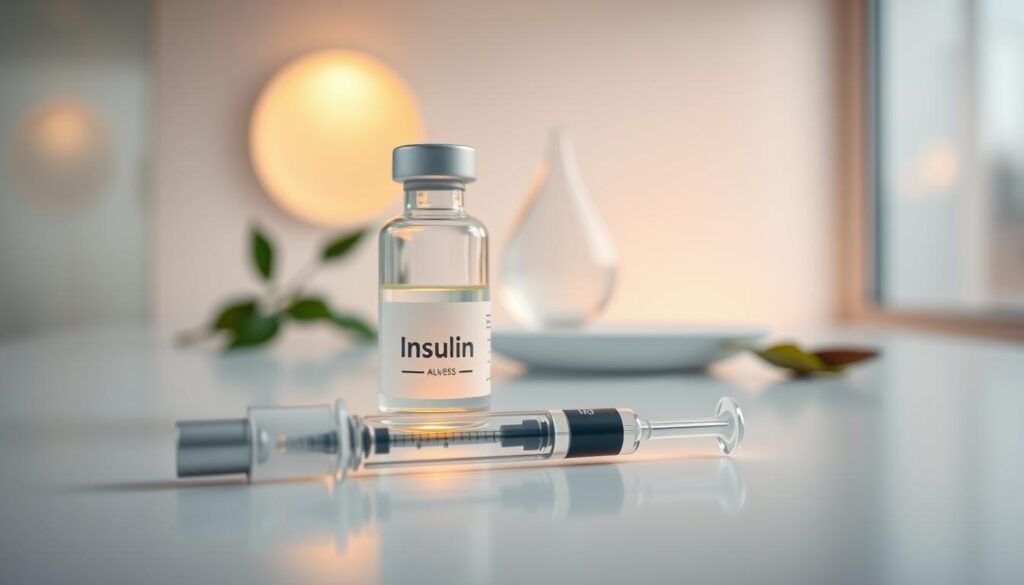Managing diabetes can seem overwhelming. But knowing about medications is crucial for controlling blood sugar. What if you could make managing your health easier? In this article, we’ll explore the different diabetes medications. We’ll see how they can help you control your blood sugar and improve your health.

Key Takeaways
- Diabetes medications are key to managing blood sugar and preventing complications.
- Insulin therapy is essential, providing insulin for the body’s cells.
- Oral hypoglycemic agents, like metformin and sulfonylureas, offer pill-based diabetes management.
- Newer medications, including DPP-4 inhibitors, GLP-1 agonists, and SGLT2 inhibitors, offer innovative ways to control blood sugar.
- Understanding different diabetes medications and how they work can help you make better treatment choices.
Understanding Diabetes and the Importance of Medication
Diabetes is a complex metabolic disorder that affects how the body regulates blood sugar levels. It comes in several forms, each with its own characteristics and health impacts. Knowing the types of diabetes and the role of medications is key to staying healthy.
Types of Diabetes and Their Impact
Type 1 diabetes is an autoimmune disorder where the body attacks and destroys insulin-producing cells. It usually starts in childhood or adolescence and requires lifelong insulin therapy. Type 2 diabetes, more common, is linked to lifestyle factors like obesity and poor diet. It makes the body less responsive to insulin or less insulin is produced.
Uncontrolled diabetes can cause serious problems like nerve damage, kidney disease, heart disease, and vision loss. Keeping blood sugar levels in check is crucial to avoid these issues and maintain health.
The Role of Medications in Diabetes Management
Medications are vital for managing both Type 1 and Type 2 diabetes. For Type 1, insulin therapy is essential since the body can’t make this hormone. Insulin can be given through injections, pens, or pumps to control blood sugar.
For Type 2, oral medications help control blood sugar. These medications increase insulin production, improve insulin sensitivity, or reduce glucose absorption. Using these medications with lifestyle changes can greatly improve blood sugar control and reduce diabetes risks.
“Medication management is a crucial component of comprehensive diabetes care. By working closely with healthcare providers, individuals with diabetes can find the right combination of treatments to effectively manage their condition and maintain optimal health.”
Insulin Therapy: A Cornerstone in Diabetes Treatment
For those with diabetes, insulin therapy is key. Insulin helps control blood sugar levels. When diabetes makes it hard to use insulin, treatment shifts to insulin therapy.
Insulin therapy uses different types of insulin. Each type works in its own way. These insulin types include:
- Rapid-acting insulin: Works fast to lower blood sugar after meals.
- Short-acting insulin: Helps control blood sugar all day.
- Intermediate-acting insulin: Lasts longer, providing insulin for hours.
- Long-acting insulin: Keeps insulin levels steady day and night.
Insulin administration can happen in several ways. These include:
- Insulin injections: Given under the skin with syringes or pens.
- Insulin pumps: Wearable devices that give insulin all day.
- Inhaled insulin: Absorbed through the lungs, a new option.
Choosing the right insulin type and insulin administration method is important. It depends on lifestyle and diabetes management goals. Always talk to a healthcare provider to find the best insulin therapy plan.
| Insulin Type | Onset of Action | Peak Effect | Duration of Action |
|---|---|---|---|
| Rapid-acting insulin | 5-15 minutes | 30-90 minutes | 3-5 hours |
| Short-acting insulin | 30-60 minutes | 2-5 hours | 5-8 hours |
| Intermediate-acting insulin | 1-3 hours | 4-12 hours | 12-24 hours |
| Long-acting insulin | 6-12 hours | No distinct peak | 24 hours or more |
Knowing about insulin types and insulin administration helps. It lets people with diabetes work with their healthcare team. Together, they can create a insulin therapy plan that meets their needs and helps control blood sugar.

“Insulin therapy is the cornerstone of diabetes management, allowing individuals to maintain healthy blood sugar levels and reduce the risk of long-term complications.”
Oral Hypoglycemic Agents: Pills for Blood Sugar Control
Managing blood sugar is key for people with diabetes. Oral hypoglycemic agents like metformin and sulfonylureas help control blood sugar. These “diabetes pills” are used alongside insulin to manage the condition.
Metformin: A First-Line Medication
Metformin is a common first choice for type 2 diabetes. It lowers liver glucose and boosts insulin sensitivity. This helps lower blood sugar. Metformin is safer than some other options and may help with weight loss and heart health.
Sulfonylureas: Stimulating Insulin Production
Sulfonylureas make the pancreas produce more insulin. Drugs like glipizide and glyburide are in this group. They help lower blood sugar, but may cause low blood sugar more often. They don’t offer the same extra health benefits as metformin.
Choosing the right diabetes medication is important. It depends on the person’s needs and health. A doctor will consider many factors to find the best treatment plan.

“Oral hypoglycemic agents can be an effective tool in managing diabetes, but they should be used as part of a comprehensive treatment plan that also includes lifestyle modifications and, in many cases, insulin therapy.”
Newer Options for Better Glycemic Control
In the world of diabetes management, new medicines are changing the game. DPP-4 inhibitors, GLP-1 agonists, and SGLT2 inhibitors are making waves. They offer new ways to control blood sugar levels.
DPP-4 Inhibitors: Enhancing Insulin Sensitivity
DPP-4 inhibitors, like sitagliptin and linagliptin, block the DPP-4 enzyme. This enzyme breaks down incretin hormones. By stopping this breakdown, these inhibitors boost insulin sensitivity and help manage blood sugar.
They do this without the risk of low blood sugar that some other meds cause. This makes them a great option for many people with diabetes.
GLP-1 Agonists: Promoting Insulin Release and Reducing Appetite
GLP-1 agonists, like liraglutide and semaglutide, act like GLP-1 hormones. They make the pancreas release more insulin and less glucagon. This helps lower blood sugar levels.
They also help you lose weight by making you feel full longer. This is because they slow down how fast food moves through your stomach. It’s a win-win for your blood sugar and your waistline.
SGLT2 Inhibitors: A Novel Approach to Glucose Management
SGLT2 inhibitors, such as empagliflozin and canagliflozin, block the SGLT2 enzyme in the kidneys. This stops your body from reabsorbing glucose, leading to more glucose in your urine. It’s a new way to lower blood sugar levels.
These meds also help you lose weight and lower your blood pressure. They’re a game-changer in diabetes care, offering more than just better blood sugar control.
FAQ
What are the different types of diabetes medications?
There are several types of diabetes medications. These include insulin therapy, oral hypoglycemic agents like metformin and sulfonylureas. Also, newer classes like DPP-4 inhibitors, GLP-1 agonists, and SGLT2 inhibitors are available.
How does insulin therapy work for managing diabetes?
Insulin therapy involves giving insulin through injections, pumps, or inhalers. It helps control blood sugar levels. Different insulins have different effects, allowing for personalized treatment.
What are the benefits and side effects of metformin, a common oral hypoglycemic agent?
Metformin is a first-line treatment for type 2 diabetes. It lowers blood sugar by reducing glucose production and improving insulin use. It’s usually safe but can cause stomach problems like nausea and diarrhea.
How do DPP-4 inhibitors and GLP-1 agonists help manage diabetes?
DPP-4 inhibitors block an enzyme that breaks down incretin hormones. This leads to more insulin and less glucagon. GLP-1 agonists directly act on GLP-1 receptors, improving blood sugar and appetite control.
What are SGLT2 inhibitors, and how do they differ from other diabetes medications?
SGLT2 inhibitors block a kidney enzyme, reducing blood sugar through urine. They offer benefits like weight loss and lower heart risk. This makes them different from other diabetes drugs.
How can continuous glucose monitoring and insulin pumps improve diabetes management?
Continuous glucose monitoring (CGM) systems give real-time blood sugar data. This helps make better treatment choices and control blood sugar. Insulin pumps mimic natural insulin, improving blood sugar and reducing hypoglycemia risk.
